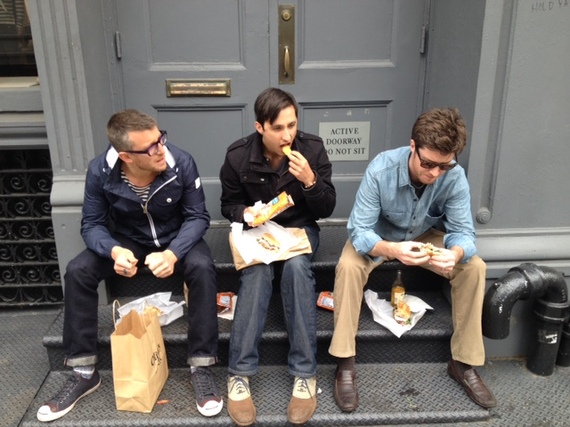The Democratic Party has reached the point of no return in distancing itself from the common people.This trend has been in the works for two decades, but today's political landscape suggests a Wallshington-funded power race between the Pentagon and Silicon Valley, one that spurs a Demopublican dystopia.
"How many professionals are there in your New York office?" Ex-schoolmates often asked me in '00s. And by "professionals" they meant MBAs, as opposed to the administrative assistants, accountants, librarians, PowerPoint experts and other staff who, peers would giggle and say, "work nine-to-six, next to small stuffed animals, to support us."
And then they'd quickly add: "You know I didn't mean that in a bad way." But MBAs didn't hang out with "nonprofessionals," didn't lunch with "support." The only three things that we had in common were: the firm, New York and the fact that we were all, or almost all, Democrats.
I was first baptized a "professional" in grad school. I accepted the term as if earned it, an accolade deserved after years of grinding homework and deadlines. I never questioned what it really meant or insinuated, where it came from and, most interesting, why and how it implied I was different from others. Were they unprofessional? See, in the early '90s, I was full of conviction. A war and a recession had just ended, and people like me were about to fix America's bottom lines. There was fresh air coming from Washington, too. We watched the Clintons (young and smart) parade down Pennsylvania Avenue, and we saw ourselves in them.
Barely unpacked in the White House, the President took up with our heroes -- getting photographed in a golf cart with Bill Gates or in a squatting position to pat Spielberg's rugrat s-- as if issuing a license for a decade of fun. Well, it was fun. It brought e-mail, e-trade, free trade, start-up IPOs, genome breakthroughs, and many another HBS leap, all endorsed by Goldman or ex-Goldman Washington stars -- and, of course, Clinton.
"You can't get away from the fact that globalization makes us interdependent," Clinton said, "so it's not an option to shed it."
The tech rush of the '90s, aided by an everything-is-fair-in-finance attitude (leading to the repeal of Glass-Steagall and the Commodity Futures Modernization Actreduction of regulation on derivatives), generated new wealth. For the first time since the Kennedy administration, being a poster child for the Democrats meant being a hip and smart "professional," bi-coasting between finance and technology hubs 40,000 feet above Roseanne labor-class Democrats in the Midwest. Inequality galloped.
Like many Europeans in the '90s, I moved to San Francisco with hopes to dot-com the world and run it. That plan didn't work out, clearly, but the man who did run things, Clinton himself, began to frequent my adopted city. First, he made sure that Chelsea settled in at nearby Stanford. Then, perhaps, he kept coming back to escape the Monica Lewinsky-obsessed D.C. Northern California provided a refuge from that, a land of entrepreneurs and Washington-conduit Gore confidents (e.g., John Doerr of Kleiner Perkins Caufield & Byers -- a VC firm that later employed Al Gore -- or Wade Randlett) who networked for shareholder, trade, recruiting and immigration policies.
Sometimes the President simply strolled in San Francisco. I remember photos on the shelves of my bakery in Chinatown: Clinton hugged by the barely English-speaking staff. "Immigration needs to be open," he asserted. "It needs to be nondogmatic and nonbigoted."
He wanted, he said, the children of bodega workers to have an equal chance of going to a university. And why not? Why shouldn't they have a shot at being "professionals" too? But could they, really? As income in the working class was increasing, its relative wealth was, ironically, decreasing. Catch Roseanne reruns and witness the belittling of Dan Conner (Roseanne Barr's sitcom husband), his near emasculation, as his children weigh support jobs for "professionals" in big cities.
After ruling Democrats shunned the Conners in the '90s, they turned into Demopublicans in the '00s. While Bush was busy spreading democracy with bombs in the Middle East, back home a financial orgy was unfolding. Top Democrats, who the previous decade had started the subprime slippery-slope (Clinton-Raines' welfare-minded lending that enticed minorities into mortgages -- sold on the bipartisan homeownership fairytale -- as social programs were cut to balance budgets), silently watched their rock star of the '90s, Alan Greenspan (a macroeconomic-chameleon from an Ayn Rand acolyte to an anthropology-minded theorist) smile at the dizzying complexity of financial products (Frankenstein-structured CDS -- Credit Default Swap -- on CDO -- Collateralized Debt Obligation) that even he did not comprehend, all the while "professionals" were trading them in unprecedented volume.
All that despite a series of derivatives fiascos that had already exploded on Greenspan's watch (Orange County, Procter & Gamble, LTCM). But stately Democrats moved on to the loftier endeavors of motivational-speaking and aid-campaigning around the world as their Learjet hosts showered them with tens of millions in consulting fees, Oscars and Nobel prizes. Funny enough, if the Democrats' passion was now the world (not just America anymore), they had a short memory for the antiwar and anti-American protests they bumped into during their conference-jet-setting in Davos and Zurich: When it came to remove Bush from office, they Xeroxed his foreign policy and then some. In January 2004, when David Kay, head of weapons inspection in Iraq, quit by announcing that no WMD could be found, John Kerry not only didn't endorse an immediate withdrawal, he also went on to attack Bush for not being effective enough in his Middle East combats in the first place.
The next Democratic president was not Bill Clinton's wife -- though it was a close call -- but the transparency-promising Barack Obama, who quickly raised status anxiety among white young "professionals" to new heights. Mingling laidback sophistication with Reaganesque glitz, film producers, hip-hop moguls, and British fashion editors, Obama turned Greenwich Village brownstones into a salon for industries and issues close to the heart of $40,000-a-plate Democrats. Suddenly, movie ratings were on the same table with gun control, immigration and health care. It became easy to confuse the party's ideas and values with the false humility of local "professionals:"
"I have to walk around the Village with a utility bill in my purse for ID," complained a devotee of a princess turned fashion designer who prefaced Nancy Pelosi's inauguration speech. "Police close off the streets for heavyweights every other week, and it's two years before the next election!"
But it was not just starstruck "professionals" who grew the gap between the Democratic Party and folks. A complicated relationship between budget, taxes and corporate law laid the foundation for Democrats and Republicans to both behave evermore alike. Between colossal bank bailouts on both Bush's and Obama's watch, New York's Democratic Senator Schumer (who makes it possible for 740 Park Avenue Republican billionaires to be taxed at 15 percent), and the years-of-concessions Volcker Rule (already challenged by positioning proprietary trading as hedging necessity), one can hear various Democratic outcries: Hillary giving Republicans a piece of her mind on reproductive rights and family planning; Obama expressing his opinion about gay marriage, or his "no patience" (whatever that means) for Russia's anti-gay laws; and a smug stance that shut down the government for two weeks over Obamacare. There were not only eye-catching headlines offering hope, but also theories about whether there might be more to these samples of Democratic showboating. Could Wallshington be quietly pushing agendas (e.g., OTC interests) into the less regulated shadow-banking space of hedge funds (moving fast into the $5 trillion "repo" space)? Or possibly into the realm of anonymous Bitcoin-like crypto- currencies (J.P. Morgan's recent filing attempt), those very markets where regulation should have been tighter in the first place?
This catch-me-if-you-can risk engineering in American politics peaks at the concurrence of traditional Republican sectors, like defense and energy, with those "sexier" Democratic precincts of entertainment and high-tech. The result could well be a playground for robots, drones, and army exoskeletons (Tactical Assault Light Operator Suit -- TALOS). Google (which recently bought military robot maker Boston Dynamics), Amazon and the Pentagon are currently caught in a three-way books-and-bombs skirmish that can make the distinction between NSA- and Google-tailing immaterial. Worse, Amazon's future domesticated robots could legitimize the Pentagon's dirtiest jobs, like unmanned killing raids in the Middle East and beyond. Big Demopublican Brother will soon be able to spread imperialism and provincialism by remote control--much like the Internet spread tolerance and defiance. Oh sure, people can stem any top-down agenda, theoretically, but as attention spans shrink (a high-tech side effect), we mechanically "favor" selfies of "professionals" in Google glasses who follow Clinton's Bush-congratulating tweets. Who could blame us for not being able to distinguish corporate from grassroots, war from fun, and, one hopes, "professionals" from "support."

